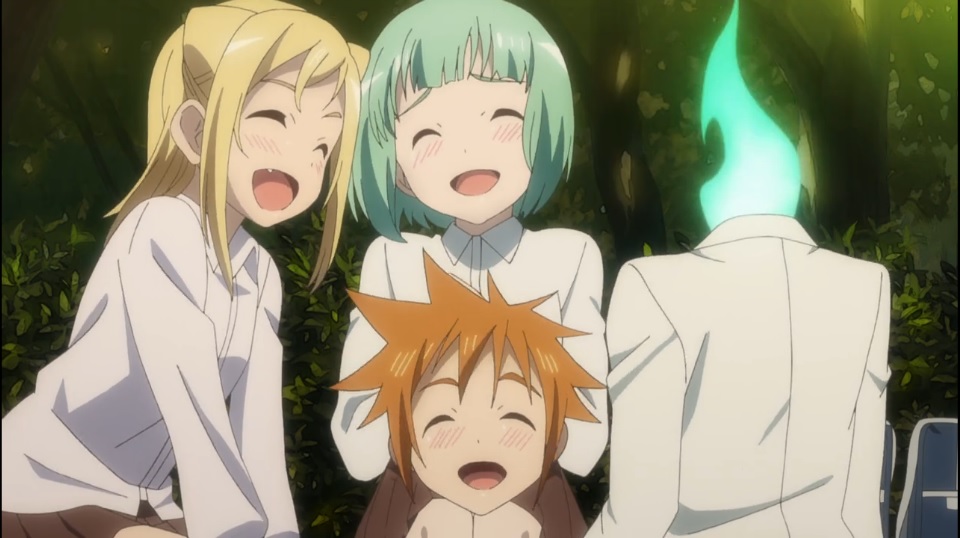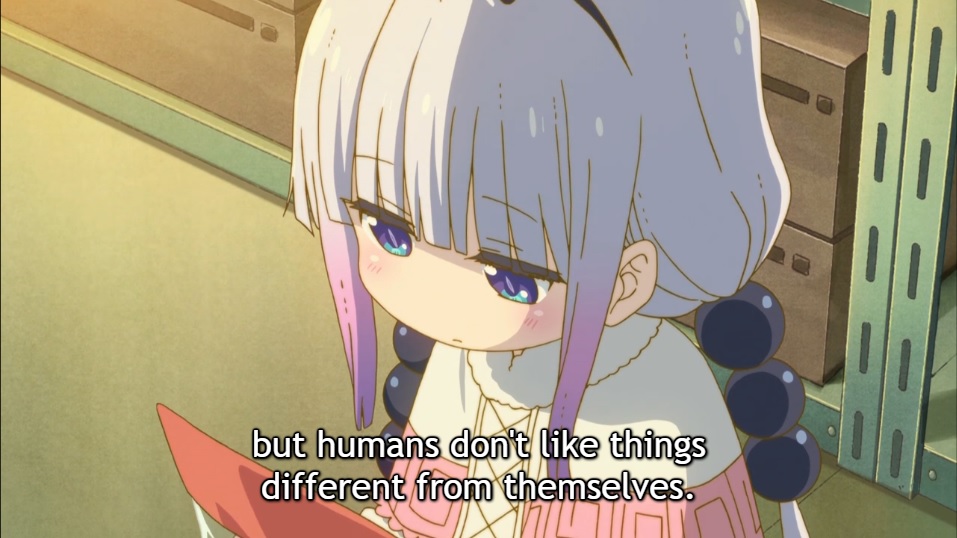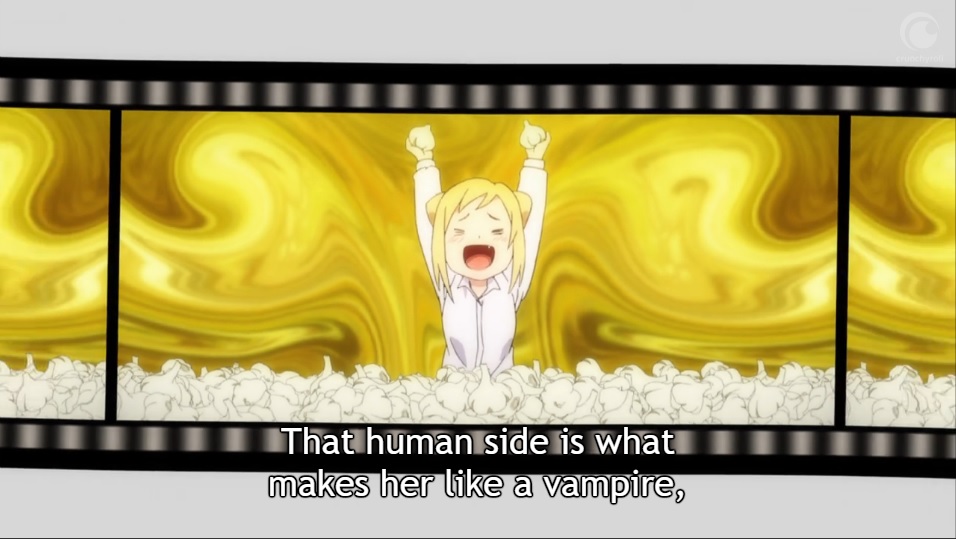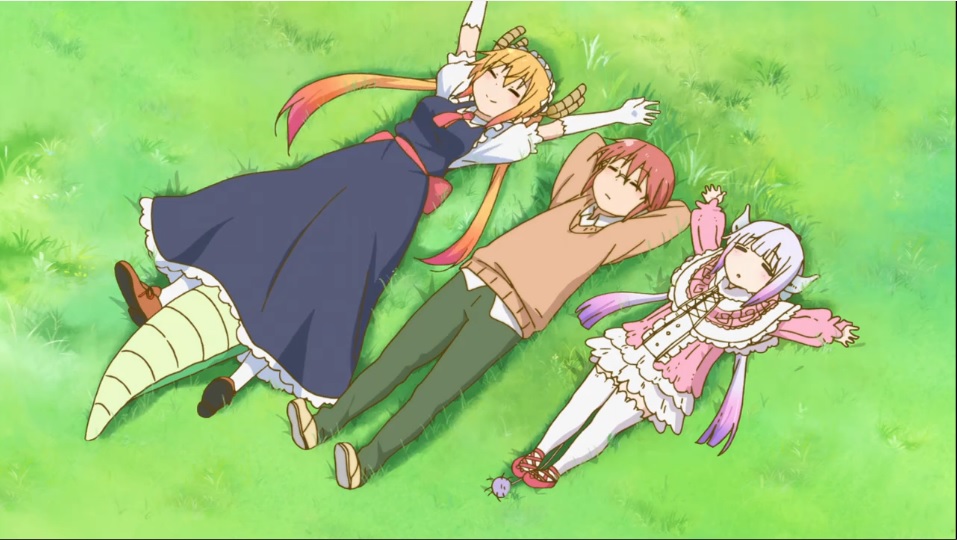Welcome to StarStruck, my new personal column where I talk about all sorts of things related to anime, manga, and other Japanese media. This time, I will be taking a look at monster girls, which have become quite popular recently. While I could not watch more than one episode of Monster Musume due to the high sexual fanservice, thankfully the current season provides some much more conservative options for getting your monster girl fill. Obviously there’s Interviews with Monster Girls(Japanese: Demi-chan wa Kataritai), which we already have two blog posts on here; there’s also Miss Kobayashi’s Dragon Maid(Japanese: Kobayashi-san Chi no Maid Dragon), which specifically features dragon girls, as well as bucks trends slightly by making the normal human lead a female office worker. Both of these shows have established themselves as my favorite shows of the season, not just because of how fun they are but also because of how they sneak in more emotional moments and just overall make the characters more relatable and likable.
What makes monster girls (and guys) such a fun subject? I think it’s because of their nature as half-human hybrids. On the one hand, their non-human sides make them exotic and interesting, but on the other hand, their human sides make them relatable. This allows for various approaches that can either highlight the comedic disparity between the character’s human and monster sides, or provide more dramatic or heartfelt moments by showing how monster girls struggle with similar things that humans do, albeit perhaps in a different form.

In particular, monster girl stories touch upon the very human struggle of being different. One thing that almost every fictional monster girl (or guy) has to deal with is how, while she is human enough that she can live as a member of human society, her monster side makes her different from other humans. While in reality we might not have actual half-monster humans, many people struggle with various aspects of themselves that make them different from others, whether it be their race, gender (in groups that heavily lean toward/favor one gender), interests, or religious beliefs. In addition, we also have to figure out how to interact with people that are different from us.
When people in general meet someone different from them, they can react with fascination or fear, oftentimes both. On the one hand, anything that is new and different stands out to us, so someone that is different will naturally draw out a certain amount of fascination, especially for someone that has gotten too used to the people around them. On the other hand, for better or for worse, people are naturally afraid of people that are significantly different from them; while we can predict when people similar to ourselves will do something to harm us, those who are different act from a different set of core values, which in turn makes them more unpredictable, and thus possibly threatening.
The fear reaction in particular has become the focus of much of the current sociopolitical scene, as discrimination issues based on gender, sexual orientation, country of origin, and more get plenty of attention. Fear drives discrimination: demeaning a group of people different from us as “inferior” helps us feel safe from them, usually because we hope they fear us instead. This is made especially clear in one scene fromDragon Maid, where Kobayashi tells the dragon girls what might happen if people find out they are dragons: they get recognized as “different”, which can lead to them being “eliminated”.

Fear may be a “natural” reaction to people who are different from us, but for Christians, who are called to love all others, fear is a reaction we must fight. Not only should we push out fear of others from our own hearts (because as followers of God we need not fear man), but also drive out others’ fear of us as much as we can. 1 John 4:18 in particular talks about how fear has no place in love, and how “perfect love casts out fear”. This verse specifically refers to how Christ’s sacrifice pushes out the fear of God’s judgment from believers, which should be reflected in how we love others. Ideally, we would create an atmosphere where those who are different from us can still open up to us without fear, though that is difficult and not always possible depending on the other person’s heart, among other things. (Note that “not fearing” someone does not mean we always have to trust them.) At the very least, though, we can refrain from saying or doing things with the intention of making others fear us.
Compared to fear, fascination seems like a better (though not mutually exclusive) reaction. However, fascination can definitely be taken too far. There’s a difference between a healthy interest in those who are different from you and an obsession that turns those who are different into circus exhibits, only to be admired for their unique traits. In Interviews, Himari, the younger twin sister of the vampire Hikari (and herself a normal human because monster-ness in this universe is more like a mutation) starts off suspicious of the teacher and monster-girl interviewer Takahashi because he seems to be interested in the monster girls (a.k.a. “demis”) solely as academic subjects, ignoring their human sides.

When she brings this up with him in episode 4, though, Takahashi responds by saying that both recognition of common humanity and interest in the demis’ uniqueness are important. Denying the latter is denying an important part of their identity, and makes it harder to address their concerns that are specifically brought about by their demi nature. By learning both their unique demi attributes and their more human sides, Takahashi-sensei has been able to get to know these girls in a more complete way, allowing him to address their demi-related worries.
These two shows provide a good example for how Christians (and people in general) can approach those who are different from us. Create an environment that casts out fear as much as possible. Connect with others through things we share in common. At the same time, show interest in the things that make them different, and where those differences cause them problems, consider ways to help them out. We can learn a lot from people who are different from us, so in the spirit of our favorite monster girl stories, go and approach those people with less fear and just the right amount of fascination.


This post offers good advice on how to interact with those who may be different from you. I will add this bit of commentary, as well:
“Though how anyone can be afraid of an adorable dragon girl like Kanna, I will never know.”
This quote reflects one of the biggest problems with accepting the differences of others indirectly: Sometimes differences between people aren’t sexy or cute. Monster Girls and shows like it depict aesthetically pleasing, appealing “different people.” (It depicts mermaids with human upper halves that have human butts! XD) Reality is a little more cruel and unfeeling. In Reality, people who are different from you aren’t just “different”— They can often come across as “ugly” or “smelly” or “unkempt” or “creepy.” My obsession with making myself look feminine serves a practical purpose other than my well-being: It offsets my autism. It offsets the strangeness of a woman whose voice is assertive and low, who constantly fidgets with her eyebrows and looks anxious, who says the wrong thing in the wrong way, who isn’t personable or animated or “sweet.” I use beauty to make all of that look cute instead of threatening or pathetic.
One of the assumptions about accepting those who are different is that we’ll run into Hollywood-glamorous different people for us to strongly empathize with, who *of course* are being discriminated against and *of course* deserve our acceptance. As an example…It’s hard to fear a woman with a hijab who is beautiful and charismatic. But it is so, so easy for people to fear a refugee with haggard features who hasn’t bathed in a week, who doesn’t speak your language, who doesn’t use your gestures and doesn’t understand what you mean, and who has a big ugly nose and tiny eyes.
Shin Sekai Yori shows the reality of the thing way, way better than any other show I have seen. The show’s villain, Squealer, is ugly and a liar and manipulative beyond belief. He does incredibly cruel or duplicitous things to protect his people, the actions of someone who has no other way to gain power and leverage. But he is brilliant and dedicated, and he loves his people, and you can’t help but think that he is right.
I’m amused that you wrote all of that based on one of my caption lines, which are usually just throwaway lines I make up on the spot late at night and aren’t really intended to be taken seriously. 😛
You’re right, though, in that accepting others is much harder when the other person is not “attractive”, based on our own perceptions of what “attractive” is, both romantically and just in general for people. That’s in part because we do not feel as threatened by attractive people, so that fear factor isn’t as strongly in play here. There’s various other culturally-based prejudices at work too that are so subtle we may not even be aware of it. The greatest test of our ability to accept others comes when dealing with these people, when we genuinely feel threatened or disgusted by them.
It does remind me of an interesting mental exercise I’ve come up with. Sometimes, when I see homeless people in the streets, if I catch myself thinking various thoughts about them, I will ask myself, “What if that person was a cute anime girl? Would I think the same thing?” The answer is admittedly oftentimes fairly humbling… Now I’m not saying imagining all homeless people as cute anime girls/boys is the best way of fighting discrimination but it can reveal some of the discriminating double-standards we don’t always know we hold.
Having an imouto with a fairly severe case of autism, I can somewhat relate to this. It did not help that she was bullied during primary school, being the only girl and the only one of her race there. We were fortunate to identify the problem before the worst could happen, and she’s learning to cope with it after periodic visits to her psychiatrist as well as the Church youth group.
So – if I may add – while we certainly need to create the right environment that welcomes different sorts of people as much as we can, I believe it is equally important to encourage them to view their own uniqueness positively rather than a liability, since we are bound to face some sort of public scrutiny/criticism sooner or later.
Glad she’s doing better now! Growing up autistic can be incredibly tough and awkward. It takes you longer to get your footing than people think it should take.
But yeah, you’re right. If we can, we should encourage our kids and friends to view the differences between themselves and others as positive. Although to be fair, it’s equally important to be willing to bend to certain aspects of society’s rules when your obsession with being “accepted as you are” is holding you back.
It’s a careful balance between ignoring the truth of it with honeyed words and not preparing our children for what the world is like…While ensuring that they do not fear what they are as something that will forever hold them back.
It’s complicated. Thanks for the follow-up! And sorry Star— I just couldn’t help but notice that that clever one-off kind of IS what’s hard about accepting others in a nutshell. ; )
And of course the main area where Christians need to learn this lesson today is with regards to people who’s Sexual Preferences aren’t the same as ours.
Which adds another layer to why Dragon-Maid is so important.
[…] The dragon would remember this bandit girl even after she left. One day, the dragon, gravely injured in a divine battle, took refuge in another world, resting upon a mountain in a land called Japan. There, she met another woman: an office lady, Miss Kobayashi. This woman was too drunk to be scared of the dragon, and instead helped her, keeping her company through the night and offering her a place to stay at her apartment. At that point, the dragon, Tohru, knew she had found somebody she wanted to devote herself to, and became Miss Kobayashi’s Dragon Maid, which also happens to be the title of my favorite anime of the previous season (and one I have talked about in the past). […]
Unfortunately the two links discussing Interviews with Monster Girls simply return 404 errors. I ran them through the Wayback Machine. The first one was archived, but the second one wasn’t.
https://web.archive.org/web/20170223145357/http://www.beneaththetangles.com:80/2017/02/03/guest-post-can-succubus-teach-us-chasity/
Okay, I just found that the posts are still here.
http://www.beneaththetangles.com/guest-post-can-succubus-teach-us-chasity/
http://www.beneaththetangles.com/annalyns-corner-everyone/
You’d probably want to update those links.
Thanks for bringing this up. I’ve fixed the links.
[…] take heart in the fact that there will come a day when you will be ready. Invite some friends (or maybe welcome a stranger, though check for dragon horns first). Read the first chapters of Luke. Reflect and pray. Put up […]